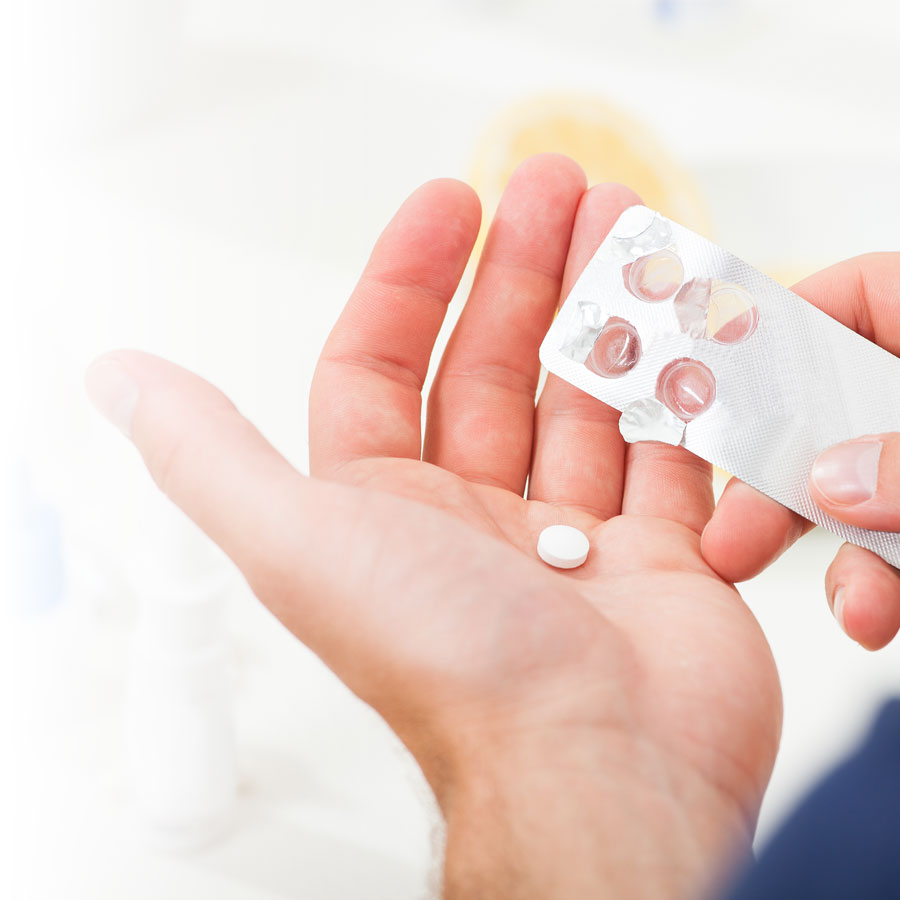Self-care using medications without medical or pharmaceutical advice is called self-medication. Find out what the risks are.
What exactly is self-medication?
When we speak of self-medication, we are not referring to taking some time to yourself with home remedies like herbal tea with a garlic-clove or honey. By definition, self-medication is the use of drugs without a medical recommendation or prescription, in other words, without the advice of a healthcare professional such as a doctor or pharmacist.
The use of medications, whether or not they are prescribed, should never be taken lightly. In order for them to be beneficial, they must be taken appropriately. Misuse can involve risks, in some important cases. This is why it’s always better to ask the advice of a knowledgeable professional, such as a pharmacist, before turning to medication.
What do people commonly treat with self-medication?
Headaches, back pain, stomach aches or tooth aches, nausea, vomiting, diarrhea, constipation, allergies, cold, flu, dry eyes, infections, dehydration, etc. The list of small or big ailments that we may want to ease or treat ourselves is very long.
For mild and transient health issues, it’s easy to say “Why see a doctor when I can resolve this myself?”. Unfortunately, there are risks associated with such a decision, not to mention the fact that an optimal treatment may be overlooked.
Why do people turn to self-medication?
In life, it is often normal to want to take the quickest or easiest path. Some people may believe that it is easier to rely on themselves for relief or treatment. However, this type of path may be filled with obstacles and hazards.
There are many reasons that can push a person to turn to self-medication:
- fear of disturbing someone
- belief that “it isn’t that bad”
- certainty that they know what to do
- impression that the pharmacist is busy
- shyness about a more embarrassing health issue
- being in a hurry
- misplaced pride
- etc.
What are the risks of self-medication?
Taking responsibility for managing one's health is a very virtuous thing to do. However, it’s important to consult experts in the field to ensure that you receive accurate information.
Your pharmacist is a healthcare specialist, but above all a medication expert. When it comes to medication, including the ones sold over the counter, they are the most knowledgeable. If you take prescription medication, a pharmacist can access your pharmacological record and provide even more informed advice on the most suitable products to choose and their optimal and safe use.
As with any medication, over-the-counter products can involve risks, such as the following:
- side effects
- drug interactions
- contraindications, warnings or precautions
- overdose or intoxication
- allergies or intolerances
- addiction
- etc.
By choosing a treatment yourself or using it without medical or pharmaceutical advice, you cannot be sure that it is the best option for you. Symptom relief or the treatment of your health issue may be partial or even non-existent.
Self-medication during the COVID-19 crisis
COVID-19 is an infection that can cause a variety of signs and symptoms, the most common being fever, coughing, breathing difficulties and a sudden loss of smell or taste. If you have one or more of them, or other symptoms pointing to an infection, it could be COVID-19, but not necessarily. Do not go to the pharmacy, but rather, call toll-free 1-877-644-4545. You will then be directed to the right place to assess your health and receive adequate care.
If medication is required to ease your symptoms and you think you already have what you need at home (e.g., acetaminophen), call the pharmacy to make sure it is the best option for you and to get information about safe and effective use.
The pharmacy can deliver the medications you need.
Here are some additional tips
- Don’t hesitate to ask your pharmacist for advice. Team members working in the pharmacy area may look very busy, but this doesn’t mean that they aren’t available to help you. They have a responsibility and a duty to answer your questions, so don’t be shy to ask for a consultation with the pharmacist.
- Call the pharmacy, as many consultations regarding medications, whether or not they are prescribed, can be done by telephone.
- Use caution when you receive “good advice” from the people around you who, despite their well-meaning intentions, don’t always have the knowledge or skills needed to compensate for your pharmacist.
- Don’t take medication that has been prescribed to someone else or that has not been recommended to you.
- For additional tips on the safe use of over-the-counter medications, read the following.

